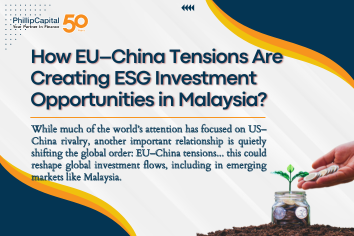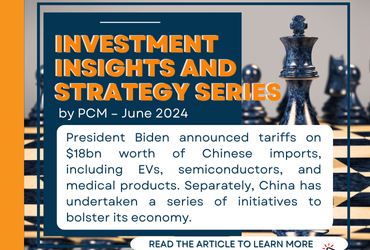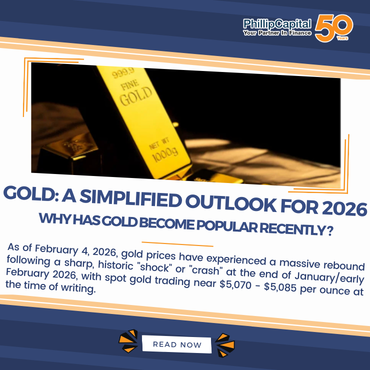
While much of the world’s attention has focused on US–China rivalry, another important relationship is quietly shifting the global order: EU–China tensions. From clean technology to agriculture and healthcare, friction is growing — and for ESG-conscious investors, this could reshape global investment flows, including in emerging markets like Malaysia.
What’s Happening Between the EU and China?
Two recent developments highlight the widening rift:
- Medical Device Procurement
In June 2025, the European Commission banned Chinese firms from bidding on public procurement contracts above €5 million for most medical devices. The move was meant to counter Beijing’s own restrictive “Buy China” policies but could disrupt existing supply chains in the medtech space. - Pork Imports Delayed
As the EU prepares to finalise tariffs on Chinese electric vehicles (EVs), China responded by extending an anti-dumping probe on EU pork imports — a €1.75 billion trade — by six months. The delay is widely seen as a bargaining chip in the ongoing tariff negotiations.
These flashpoints are part of a broader wave of EU–China disputes over solar panels, rare earth minerals, and clean-tech subsidies. While these actions are designed to protect strategic interests, they also create ripple effects for global supply chains and ESG-focused capital.
EU–China tensions present both risks and opportunities. On the risk side, tighter trade restrictions and geopolitical uncertainty can disrupt the clean energy transition. For example, EU tariffs on Chinese electric vehicles may increase the cost of green mobility, while China’s export controls on rare earth minerals could delay the production of wind turbines and batteries—potentially hindering short-term climate goals.
However, these challenges are also prompting the EU to accelerate efforts to diversify and localise its clean-tech manufacturing. Initiatives such as building domestic battery plants, investing in ethically sourced minerals, and prioritising ESG-compliant suppliers are gaining momentum. These shifts open up new pathways for countries like Malaysia and broader ASEAN markets to position themselves as alternative partners in the global supply chain.
What It Means for Malaysia
Malaysia — with its growing ESG ambitions, maturing supply chains, and strong trade ties with both the EU and China — stands to benefit from the shifting global landscape in several key ways.
One major opportunity lies in supply chain diversification. As European companies seek to reduce their dependence on China, Malaysia can position itself as a strategic “China+1” destination. Sectors such as electronics, medical devices, and green manufacturing are especially well-placed to attract attention. ESG-focused investors are likely to favour Malaysian companies that demonstrate transparency, environmental compliance, and ethical labour practices — areas where Malaysia can continue to strengthen and lead regionally.
Malaysia’s growing capabilities in clean technology and renewable energy also present compelling opportunities. The country is actively expanding its solar manufacturing, EV component production, and battery supply chain. As the EU looks for alternative partners to support its green transition, Malaysian clean-tech firms that align with ESG standards may attract foreign investment or international partnerships. Investors focused on ESG themes may find long-term value in companies involved in RE100 targets, carbon markets, or clean energy exports.
Finally, digital governance and regulatory compliance are becoming increasingly important. The EU is rolling out comprehensive ESG regulations — such as the Corporate Sustainability Due Diligence Directive — which will soon impact any company exporting to the European market. Malaysian firms that proactively adopt international ESG reporting standards, such as GRI, TCFD, or ISSB, will be better positioned to meet these requirements. Early adopters not only gain access to EU markets but also become more attractive to ESG-aligned funds and global institutional investors.
Together, these developments signal that Malaysia is well placed to seize emerging ESG-aligned investment opportunities in a more fragmented, yet sustainability-driven, global economy
Identify investment opportunities – Phillip Managed Account for Retirement (PMART) and Phillip Managed Account (PMA) ESG
In line with the nation’s goal towards sustainability, Phillip Capital Management has integrated ESG factors that we attest as material and relevant for a company’s financial performance and long-term sustainability into our investment decision-making process. These include but not limited to ESG ratings by established index, environmental considerations (climate change, natural resources preservation, pollution & waste), social considerations (health & safety, community engagement, employee relations) and governance considerations (board independence, transparency & disclosure, shareholder rights).
Separately, PCM offers PMART and PMA ESG, a discretionary portfolio that invests in stocks with high ESG ratings from the F4GBM and F4GBMS Indices. There are both conventional and Shariah options available. PMART and PMA ESG is suitable for investors who want to optimise the risk-adjusted return by constructing a diverse sustainable portfolio of ESG companies. Exhibits 1-4 show the performance for PMART ESG Conventional and Shariah.
Exhibit 1: Phillip PMART ESG Conservative Portfolio Performance
| YTD | 1Y | 2Y | 3Y | 5Y | |
| Phillip PMART ESG Conservative Portfolio | -4.50% | 0.27% | |||
| F4GBM | -9.74% | -6.12% |
Exhibit 2: Phillip PMART ESG Aggressive Portfolio Performance
| YTD | 1Y | 2Y | 3Y | 5Y | |
| Phillip PMART ESG Aggressive Portfolio | -4.50% | -0.27% | |||
| F4GBM | -9.74% | -6.12% |
Exhibit 3: Phillip PMART ESG Shariah Conservative Portfolio Performance
| YTD | 1Y | 2Y | 3Y | 5Y | |
| Phillip PMART ESG Shariah Conservative Portfolio | -3.23% | 1.28% | |||
| F4GBMS | -10.19% | -8.87% |
Exhibit 4: Phillip PMART ESG Shariah Aggressive Portfolio Performance
| YTD | 1Y | 2Y | 3Y | 5Y | |
| Phillip PMART ESG Shariah Aggressive Portfolio | -5.09% | -5.78% | |||
| F4GBMS | -10.19% | -8.87% |
Source: PCM, 31 May 2025, link
Please click on the link to learn more or email us at cse.my@phillipcapital.com.my if you require any further information.
Disclaimer:
The information contained herein does not constitute an offer, invitation or solicitation to invest in Phillip Capital Management Sdn Bhd (“PCM”). This article has been reviewed and endorsed by the Executive Director (ED) of PCM. This article has not been reviewed by The Securities Commission Malaysia (SC). No part of this document may be circulated or reproduced without prior permission of PCM. This is not a collective investment scheme / unit trust fund. Any investment product or service offered by PCM is not obligations of, deposits in or guaranteed by PCM. Past performance is not necessarily indicative of future returns. Investments are subject to investment risks, including the possible loss of the principal amount invested. Investors should note that the value of the investment may rise as well as decline. If investors are in any doubt about any feature or nature of the investment, they should consult PCM to obtain further information including on the fees and charges involved before investing or seek other professional advice for their specific investment needs or financial situations. Whilst we have taken all reasonable care to ensure that the information contained in this publication is accurate, it does not guarantee the accuracy or completeness of this publication. Any information, opinion and views contained herein are subject to change without notice. We have not given any consideration to and have not made any investigation on your investment objectives, financial situation or your particular needs. Accordingly, no warranty whatsoever is given and no liability whatsoever is accepted for any loss arising whether directly or indirectly as a result of any persons acting on such information and advice.






